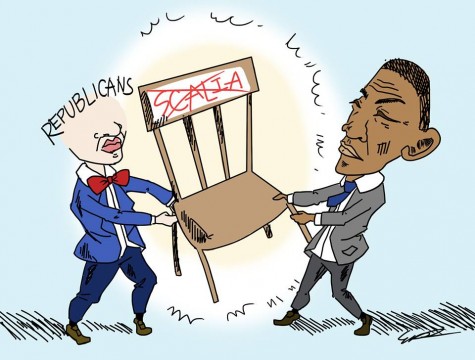Justice Antonin Scalia’s death presents Obama with the chance to alter America’s future
March 10, 2016

On Feb. 13, Supreme Court Justice Antonin Scalia passed away at age 79, sparking conflicts between President Obama and Republicans over whether or not he should be allowed to exercise his constitutional right to nominate a new justice and dramatically shifting the balance of the Supreme Court and America.
Known for his conservative policies, Scalia was appointed in 1986 by President Ronald Reagan. He is survived by his wife, Maureen Scalia, and nine children. Scalia was visiting the Cibolo Creek Ranch, an elite hunting ranch, with friends to hunt blue quail. He was found dead on Saturday morning by the ranch owner after being non-responsive for the entire morning. He is thought to have died of natural causes and his family has chosen to forgo an autopsy. Although most people have accepted that he died because of his chronic conditions, further investigation is being conducted as the general public begins to develop conspiracy theories. This is due to the fact that Scalia was found with a pillow over his head at the site of his death, and that no autopsy was conducted. However, his family wishes to respect his body and not turn his death into a large political matter.
While Scalia was still alive, he was combative and outspoken about his views on ways to achieve social progress and his stance on recurring issues in America. He was a champion of originalism, which is the idea of upholding the textual message of the Constitution as it was written. He once stated, “The Constitution that I interpret and apply is not living but dead, or as I prefer to call it, enduring. It means today not what current society, much less the court, thinks it ought to mean, but what it meant when it was adopted.”
During his tenure, Scalia consistently attacked the Court’s decisions that he believed deviated from the strict text of the Constitution. For example, Scalia enraged liberals in 2012 by hoping to overturn the Roe vs. Wade decision of 1873, which increased the right to privacy for women and permitted abortion. Scalia declared that it was unconstitutional to require all states to allow abortion, and that it was rather a matter of democratic choice. Scalia also openly scorned affirmative action for African Americans. He believed that such a policy could only occur at the expense of newer immigrants. Furthermore, Scalia condemned the Miranda decision which required the police to read prisoners a list of their rights.
Other notable conservative opinions posed by Scalia are his rulings against gay marriage and the Voting Rights Act. On homosexuality, Scalia once said, “Of course it is our moral heritage that one should not hate any human being or class of human beings. But I had thought that one could consider certain conduct reprehensible — murder, for example, or polygamy, or cruelty to animals — and could exhibit even ‘animus’ toward such conduct. Surely that is the only sort of ‘animus’ at issue here: moral disapproval of homosexual conduct[.]” In doing so, he likened homosexuality to murder. On the Voting Rights Act of 1965, Scalia labeled it an “embedded form of racial entitlement.” Such statements made Scalia an enemy to liberal groups.
With Scalia dead and his position vacant, the Supreme Court now only consists of eight justices, divided evenly between liberals and conservatives. Previously, the Court was dominated by conservatives with Scalia keeping the ratio at five to four. Without Scalia’s conservative voice in the Court, it provides the possibility of an even split.
As of now, the case on the docket that will experience the immediate effects Scalia’s death is the Friedrichs vs. the California Teachers Association case, which is essentially an anti-union lawsuit. The center of this case is Rebecca Friedrichs, who sued the CTA to overturn agency fees and mandatory union membership. Friedrichs works along with the Center for Individual Rights, which also represents 10 other teachers.The anti-union plaintiffs conceded at every lower court in order to fast-track their case to the Supreme Court. Their strategy was to have the conservative majority of the Supreme Court overturn the decisions of the lower courts in their favor. However, with Scalia’s death, the vote will likely be split even. In such a case, the lower court’s decision to reject Friedrichs’ argument will be upheld (Washington Post).
In the midst of the heated 2016 presidential elections, Scalia’s passing has caused the Republican candidates to collectively unite against President Obama in the fight for who gets to claim the right to elect the next Justice. His death has become the priority and topic of the ongoing presidential debates, with candidates being questioned on how they would go about their nominations.
Senate Republicans have made it their task to ensure that the nomination is left to the winner of the upcoming general election, since Obama’s his time in office is almost up. Even if Obama did decide to nominate a liberal justice, republicans in the Senate may also have the capability of blocking the Obama’s nomination if they collectively decide to unite against him.
Many of the current Republican candidates have expressed their adamancy on preventing Obama from taking action.
Senator Ted Cruz says, “Two branches of government hang in the balance, not just the presidency, but the Supreme Court” (New York Times).
He references the continuous issues regarding abortion, immigration, gun control, and gay marriage. A soon-to-be new president and new justice may entirely reorder America from how it operates today.
Republican candidate and former neurosurgeon Ben Carson insists, “It is imperative that the Senate not allow President Obama to diminish his legacy by trying to nominate an individual who would carry on his wishes to subvert the will of the People. Given the dire condition our democracy currently finds itself under Obama’s ideological agenda, I call on the Senate to stop any attempts to fill this crucial seat until We The People elect a strong Constitutionalist this November” (NBC).
However, it is clearly stated in the Constitution that it is the current president’s task to nominate a supreme court justice, and it has been unprecedented for a year to pass with a vacant position in the Court. In the years Obama has been in office, he already nominated two justices, Justices Sonia Sotomayor and Elena Kagan, respectively. The replacement for Scalia will be his third.
Unwilling to relinquish his constitutionally given right as president, Obama states, “I plan to fulfill my constitutional responsibilities to nominate a successor in due time. There will be plenty of time for me to do so and for the Senate to fulfill its responsibility to give that person a fair hearing and a timely vote. These are responsibilities that I take seriously, as should everyone. They are bigger than any one party; they are about our democracy” (New York Times).
Former Secretary of State and Democratic candidate Hillary Clinton stated, “The Republicans in the Senate and on the campaign trail who are calling for Justice Scalia’s seat to remain vacant dishonor our Constitution. The Senate has a constitutional responsibility here that cannot abdicate for partisan political reasons” (NBC).
What some Republicans may have failed to realize is that even if the vacant position isn’t filled until the next president is in office, a deadlock between liberals and conservatives in the Supreme Court would instantly send the decision to the White House and Congress. Ultimately, President Obama may still have the final say in major decisions sent to him from the Court.
Obama’s decision has the potential to transform the structure of the Supreme Court and subsequently, the United States. Whether Obama will succumb to conservative pressures and nominate a moderate or utilize his power to attempt to nominate a liberal, it may be one of the biggest imprints he will make on the country in his time in office.


